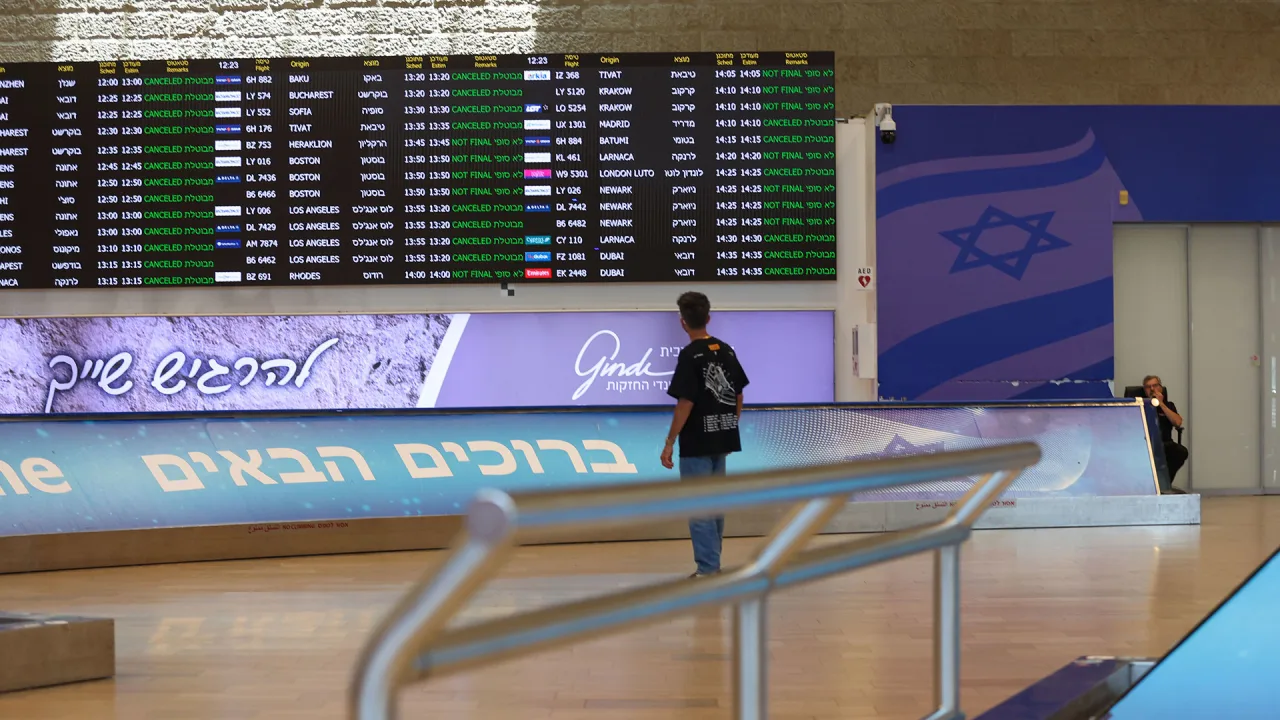Israel-Iran conflict grounds flights and clears Middle East airspace
Tensions in the Middle East reached a critical point last night as Israel launched an offensive strike targeting Iran’s nuclear facilities and military installations. Iran responded swiftly, raising fears that the two nations—and possibly the wider region—are on the brink of full-scale war. In the immediate aftermath, airlines across the globe scrambled to reroute or cancel flights, clearing airspace over Israel, Iran, and neighboring countries. If you’re scheduled to travel to, from, or through the region, here’s what you need to know. Israeli, Iranian, Jordanian, and Iraqi airspace cleared within hours Within hours of Israel launching its offensive, airlines quickly cleared Israeli, Iranian, Jordanian, and Iraqi airspace. The move is a preemptive one meant to ensure that commercial airliners are not inadvertently struck by missiles or other weapons launched between the countries. As you can see from the embedded FlightRadar24 flight tracker below, shortly after 11:30 p.m. UTC last night, commercial aircraft began being diverted from the affected airspace. By 2 a.m. UTC this morning, nearly all commercial aircraft had been redirected. 9-second video of the clearing of Iranian and Iraqi airspace. pic.twitter.com/VZLWbmk9sC— Flightradar24 (@flightradar24) June 13, 2025 Israel’s Ben Gurion Airport closed Israel’s main international airport, Ben Gurion Airport (TLV), which is located 12 miles southeast of Tel Aviv, was quickly closed, according to a report from the Times of Israel. According to a pop-up notice on the airport’s website, all flights to and from the airport are canceled until further notice. “Due to the current special security situation, all flights to and from Ben Gurion Airport (LLBG) are canceled until further notice,” the notice reads. “Please be advised: Do not travel to the airport.” CNN reports that other airports in the region also remain closed, including Tehran’s Mehrabad Airport and Amman’s Queen Alia International Airport. Flights from the U.S. affected, too While the conflict is in the Middle East, it has affected flights operated by U.S.-based airlines. As CNBC notes, Delta and United have canceled flights to Tel Aviv through at least Saturday. Flights that were already in the air when the conflict broke out reportedly turned around to the New York area. Delta Airlines has posted a travel advisory related to the unrest, in which the airline warns that “travel to, from, or through” Tel Aviv, Israel (TLV) “may be impacted” if the flight is scheduled from now until June 30, 2025. The company has listed the options ticket holders have to rebook their affected flights. What should I do if I have a flight booked? If you have a flight booked that is scheduled to depart to or from, or travese through, the Middle East area—particularily the countries of Israel, Iran, Iraq, and Jordan—you shoiuld check with your airline directly to see whether the flight is still operating, has been altered or rescheduled, or has been canceled. Travelers should also enable notifications from the airlines’ apps to ensure they receive the latest updates to any affected flights in a timely manner.

Tensions in the Middle East reached a critical point last night as Israel launched an offensive strike targeting Iran’s nuclear facilities and military installations. Iran responded swiftly, raising fears that the two nations—and possibly the wider region—are on the brink of full-scale war.
In the immediate aftermath, airlines across the globe scrambled to reroute or cancel flights, clearing airspace over Israel, Iran, and neighboring countries. If you’re scheduled to travel to, from, or through the region, here’s what you need to know.
Israeli, Iranian, Jordanian, and Iraqi airspace cleared within hours
Within hours of Israel launching its offensive, airlines quickly cleared Israeli, Iranian, Jordanian, and Iraqi airspace. The move is a preemptive one meant to ensure that commercial airliners are not inadvertently struck by missiles or other weapons launched between the countries.
As you can see from the embedded FlightRadar24 flight tracker below, shortly after 11:30 p.m. UTC last night, commercial aircraft began being diverted from the affected airspace. By 2 a.m. UTC this morning, nearly all commercial aircraft had been redirected.
Israel’s Ben Gurion Airport closed
Israel’s main international airport, Ben Gurion Airport (TLV), which is located 12 miles southeast of Tel Aviv, was quickly closed, according to a report from the Times of Israel.
According to a pop-up notice on the airport’s website, all flights to and from the airport are canceled until further notice.
“Due to the current special security situation, all flights to and from Ben Gurion Airport (LLBG) are canceled until further notice,” the notice reads. “Please be advised: Do not travel to the airport.”
CNN reports that other airports in the region also remain closed, including Tehran’s Mehrabad Airport and Amman’s Queen Alia International Airport.
Flights from the U.S. affected, too
While the conflict is in the Middle East, it has affected flights operated by U.S.-based airlines. As CNBC notes, Delta and United have canceled flights to Tel Aviv through at least Saturday. Flights that were already in the air when the conflict broke out reportedly turned around to the New York area.
Delta Airlines has posted a travel advisory related to the unrest, in which the airline warns that “travel to, from, or through” Tel Aviv, Israel (TLV) “may be impacted” if the flight is scheduled from now until June 30, 2025. The company has listed the options ticket holders have to rebook their affected flights.
What should I do if I have a flight booked?
If you have a flight booked that is scheduled to depart to or from, or travese through, the Middle East area—particularily the countries of Israel, Iran, Iraq, and Jordan—you shoiuld check with your airline directly to see whether the flight is still operating, has been altered or rescheduled, or has been canceled.
Travelers should also enable notifications from the airlines’ apps to ensure they receive the latest updates to any affected flights in a timely manner.











































































![https //g.co/recover for help [1-866-719-1006]](https://newsquo.com/uploads/images/202506/image_430x256_684949454da3e.jpg)


























![[PATREON EXCLUSIVE] The Power of No: How to Say It, Mean It, and Lead with It](https://tpgblog.com/wp-content/uploads/2025/06/just-say-no.jpg?#)




















































